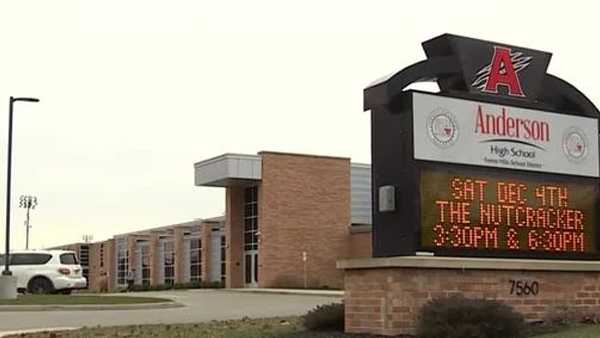

There is a more intense focus Wednesday night on the mental health and well-being of youth.It comes after the loss of two students at Anderson High School and a social media eruption about the need to improve suicide prevention methods across the board.Experts on the subject told us today not enough is being done to make sure the mental outlook of students is good. The Anderson Mental Health Collaborative is going virtual with hundreds of parents who have registered to listen and learn more about what can be done.Last Wednesday's mental wellness gathering by the collaborative attracted three people.Beth Dulle was highly bothered by the lack of interest and took to Facebook to let it be known that the community is falling short of what it needs to do.She also said candidly, "I was one of those parents. I was not attending that, you know, when my kids were in school. I wish I had. But I had other priorities at the time."Her son, Brogan, took his own life seven and a half years ago. He was a 21-year-old University of Cincinnati student at the time.She lives with that pain every moment and is determined to change the mindset about mental health which she said remains a stigma.Dulle knows many children suffer silently, that many parents are also silent, and that the silence has gone on for far too long."I think people are really, really involved in their kids' extracurriculars, their grades, what school they're gonna get into. But we're not focusing enough on the mental health of our youth," she stated.Dulle is part of 1N5, a nonprofit that educates by its very name, which refers to the percentage of people with mental health problems.By now, those who labor there believe the actual figure is higher than 20%.They have literature that spells out the symptoms and lists the resources that are available for those who are struggling with their mental fitness.1N5 is in 100 schools and wants Anderson families to be more invested, starting tonight. "We've had some loss," noted Nancy Eigle-Miller, the executive director. "And it's very tragic. And let's educate ourselves, let's ask the questions, let's know what we're looking at, and let's be proactive."Most of the 457 who registered for the webinar are parents, who will hear tonight how the not-yet-fully-developed brain plays into the need for greater understanding of the way teenagers make decisions. "They don't think about this for very long," she said."They react really quickly. So, they could think about I'm unhappy right now, something happens in their life and they take action really fast."According to 1N5, 50% of mental illness has surfaced by age fourteen and 75% has surfaced by age 24."It takes eight to 10 years to get service," Eigle-Miller said.She said there simply are not enough mental health therapists to meet the needs. Most mental health services are not covered by insurance companies, which she said compounds the problem.They will hear from an expert therapist tonight about the pre-frontal cortex of children and also about their own mindset when it comes to mental health."It's not being prioritized," Dulle said. "And it needs to be."Experts said the pandemic has exacerbated the stress level and despondency."This is a very unusual time," Eigle-Miller said, noting the burnout factor for those who work in the field.Despite the effects of the pandemic, resources exist for another ‘P-word’ right now: prevention.
There is a more intense focus Wednesday night on the mental health and well-being of youth.
It comes after the loss of two students at Anderson High School and a social media eruption about the need to improve suicide prevention methods across the board.
Experts on the subject told us today not enough is being done to make sure the mental outlook of students is good.
The Anderson Mental Health Collaborative is going virtual with hundreds of parents who have registered to listen and learn more about what can be done.
Last Wednesday's mental wellness gathering by the collaborative attracted three people.
Beth Dulle was highly bothered by the lack of interest and took to Facebook to let it be known that the community is falling short of what it needs to do.
She also said candidly, "I was one of those parents. I was not attending that, you know, when my kids were in school. I wish I had. But I had other priorities at the time."
Her son, Brogan, took his own life seven and a half years ago. He was a 21-year-old University of Cincinnati student at the time.
She lives with that pain every moment and is determined to change the mindset about mental health which she said remains a stigma.
Dulle knows many children suffer silently, that many parents are also silent, and that the silence has gone on for far too long.
"I think people are really, really involved in their kids' extracurriculars, their grades, what school they're gonna get into. But we're not focusing enough on the mental health of our youth," she stated.
Dulle is part of 1N5, a nonprofit that educates by its very name, which refers to the percentage of people with mental health problems.
By now, those who labor there believe the actual figure is higher than 20%.
They have literature that spells out the symptoms and lists the resources that are available for those who are struggling with their mental fitness.
1N5 is in 100 schools and wants Anderson families to be more invested, starting tonight.
"We've had some loss," noted Nancy Eigle-Miller, the executive director. "And it's very tragic. And let's educate ourselves, let's ask the questions, let's know what we're looking at, and let's be proactive."
Most of the 457 who registered for the webinar are parents, who will hear tonight how the not-yet-fully-developed brain plays into the need for greater understanding of the way teenagers make decisions.
"They don't think about this for very long," she said.
"They react really quickly. So, they could think about I'm unhappy right now, something happens in their life and they take action really fast."
According to 1N5, 50% of mental illness has surfaced by age fourteen and 75% has surfaced by age 24.
"It takes eight to 10 years to get service," Eigle-Miller said.
She said there simply are not enough mental health therapists to meet the needs.
Most mental health services are not covered by insurance companies, which she said compounds the problem.
They will hear from an expert therapist tonight about the pre-frontal cortex of children and also about their own mindset when it comes to mental health.
"It's not being prioritized," Dulle said. "And it needs to be."
Experts said the pandemic has exacerbated the stress level and despondency.
"This is a very unusual time," Eigle-Miller said, noting the burnout factor for those who work in the field.
Despite the effects of the pandemic, resources exist for another ‘P-word’ right now: prevention.
Source link









